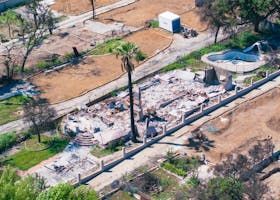The Las Vegas real estate market in 2025 presents a compelling narrative of market transformation, unprecedented inventory growth, and emerging buyer opportunities. As the entertainment capital navigates post-pandemic recovery while facing new economic realities, the housing market reflects broader shifts in consumer behavior, investment patterns, and demographic trends that are reshaping Southern Nevada's real estate landscape.
This comprehensive analysis examines every facet of the Las Vegas housing market, from current pricing dynamics and neighborhood-specific trends to investment strategies and economic forecasts. Whether you're a prospective homebuyer, seasoned investor, or real estate professional, understanding these market fundamentals is crucial for making informed decisions in one of America's most dynamic metropolitan areas.
Current Las Vegas Real Estate Market Overview: Key Statistics and Performance Indicators
The Las Vegas real estate market in 2025 is characterized by a significant shift toward buyer-favorable conditions, with inventory levels reaching unprecedented heights while sales activity moderates from previous years' frenzied pace.
Las Vegas Home Prices: Current Market Data and Trends
As of mid-2025, the median home price in Las Vegas stands at $458,000, representing a modest 1.7% increase year-over-year according to recent market data. This measured growth marks a dramatic contrast to the double-digit appreciation rates experienced during the pandemic housing boom, indicating a market entering a more sustainable growth phase.
The price per square foot currently averages $261, down 0.38% since last year, reflecting the increased inventory and buyer negotiation power. Notably, Las Vegas home prices remain just 2% higher than the national average, making the market relatively accessible compared to other major metropolitan areas in the western United States.
Current market dynamics show homes selling in an average of 51 days, significantly longer than the 35 days recorded in 2024. This extended time on market indicates a shift from the seller's market conditions that dominated recent years, providing buyers with more time to make decisions and negotiate terms.
Las Vegas Housing Market Competition and Inventory Surge
Perhaps the most significant development in the Las Vegas housing market is the dramatic increase in available inventory. Listings have soared 77% across the metro area, making Las Vegas the epicenter of nationwide inventory growth. This surge represents a fundamental shift from the supply-constrained conditions that characterized the market during the pandemic era.
Properties currently receive an average of 2 offers, down from the multiple-offer situations common in previous years. Sales volume reflects this moderation, with 2,087 single-family homes sold in May 2025, down 13.1% from May 2024 and representing a 4% decline from April 2025.
The months of available inventory have increased to 4 months, up from 3.65 months previously, signaling a transition toward more balanced market conditions. Price reductions have increased 95% over last year, indicating seller flexibility in response to market conditions.
Economic Drivers: Las Vegas Beyond Tourism and Entertainment
While tourism and entertainment remain central to Las Vegas's economic identity, the region's economic diversification efforts are creating new opportunities and challenges for the real estate market.
Tourism and Hospitality Sector Performance
Las Vegas welcomed 40.8 million visitors in 2023, marking a 5.2% increase and demonstrating strong recovery momentum. The tourism sector contributes approximately $85.2 billion in total economic impact to Southern Nevada, with $51.5 billion in direct spending supporting the local economy.
Gaming revenue reached a record $15.76 billion in fiscal year 2024, with the Strip generating $9.1 billion, representing a 6% year-over-year increase. However, 2025 has shown some signs of moderation in gaming revenue growth, reflecting broader economic uncertainties and changing consumer spending patterns.
The hospitality sector directly employs 252,610 workers, representing 22.6% of the region's workforce. Hotel occupancy rates have stabilized around 83.5% with an average daily rate of $191.29, though February 2025 saw a 3.5% decline in occupancy to 81.4%.
Economic Diversification and New Industry Growth
Las Vegas is experiencing significant growth in healthcare and biotech industries, with education and health services adding 4,200 jobs year-over-year. Major healthcare investments include expansions by Intermountain Health, Cleveland Clinic, and West Henderson Hospital, creating high-paying employment opportunities that support housing demand.
The technology sector is expanding with major developments including Warner Bros' $8.5 billion film studio expansion and Sony Pictures' $1.8 billion movie studio development in Summerlin. These projects represent long-term commitments to the region's economic diversification beyond traditional tourism and gaming.
Manufacturing growth is evident with facilities like the Haas Automation facility in West Henderson beginning construction, further establishing the region as a tech and manufacturing hub. Government employment has grown 1.5% year-over-year, adding 1,800 jobs and providing economic stability.
Neighborhood Analysis: Where to Buy in Las Vegas in 2025
Las Vegas's diverse neighborhoods offer varying value propositions, from luxury master-planned communities to emerging areas with strong rental potential. Understanding local market dynamics is essential for successful real estate investment and homebuying decisions.
Premium Communities: Summerlin and Henderson
Summerlin remains Las Vegas's premier master-planned community, encompassing over 22,500 acres with diverse neighborhoods, abundant parks, and extensive hiking trails. The median home price in Summerlin has reached approximately $680,000, marking a 3.1% year-over-year increase despite broader market moderation.
Properties in Summerlin continue to sell quickly with multiple offers, especially in gated sections and newer developments. The community's proximity to Red Rock Canyon, downtown Summerlin shopping and entertainment district, and excellent schools maintain strong buyer demand. Investment interest remains robust due to Summerlin's stability and higher rental rates, with two-bedroom apartments commanding average rents of $2,500 monthly.
Henderson, positioned southeast of the Las Vegas Strip, has developed into a vibrant suburban hub attracting young families and remote professionals. The median home price in Henderson stands around $520,000, representing a 4% year-over-year increase. The area's top-rated schools, clean parks, and strong safety record continue drawing buyers seeking family-friendly environments.
Henderson's rental market prices one-bedroom apartments between $1,800 and $2,000 monthly, reflecting strong demand from residents priced out of central Las Vegas neighborhoods. The area offers excellent long-term appreciation potential and consistent rental income opportunities.
Emerging Value Neighborhoods: North Las Vegas and Centennial Hills
North Las Vegas represents one of the most compelling value propositions in the Las Vegas metro area, with a median home price of $385,000, up 3.5% from the previous year. This diverse community offers affordable housing options while maintaining proximity to employment centers and major transportation corridors.
The area attracts families, retirees, veterans, and young professionals seeking accessible homeownership opportunities. Recent infrastructure improvements and new business development contribute to steady appreciation potential, making North Las Vegas attractive for both owner-occupants and investors.
Centennial Hills, located in northwest Las Vegas, features newer single-family home communities with beautiful mountain views and convenient freeway access. The neighborhood offers quality family amenities including shopping, restaurants, schools, and parks while maintaining distance from the urban intensity of central Las Vegas.
Using the I-215 and 95 freeways, residents enjoy quick access to Summerlin, North Las Vegas, and other major employment centers. The area's focus on newer construction and family-oriented amenities makes it attractive for long-term homeownership and rental investment.
Investment-Focused Areas: Enterprise and Green Valley
Enterprise represents an up-and-coming area where new construction is rapidly expanding housing options. Located on Las Vegas's southern end, the neighborhood borders Spring Valley, Paradise, and Henderson, providing excellent access to major transportation routes including I-15 and I-215.
Families are attracted to Enterprise's intuitively designed communities and newer amenities. However, potential investors should note that many newer homeowners' associations may have restrictions on rental properties, requiring careful due diligence before investment decisions.
Green Valley, divided into North and South sections within Henderson, offers compelling investment opportunities with different risk-reward profiles. Green Valley North provides homes priced 15% below Henderson averages while generating rental rates 7% higher than Las Vegas investment property averages, partly due to legal short-term rental opportunities.
Green Valley South features homes priced 10% below area averages with strong appreciation expectations. The area's excellent schools, amenities, and low crime rates support both owner-occupancy and rental demand.
Las Vegas Real Estate Market Predictions: Expert Forecasts for 2025-2026
Industry analysts and local economists provide measured outlooks for Las Vegas's housing market trajectory, emphasizing the transition from rapid growth to more sustainable market conditions.
Interest Rate Environment and Mortgage Market Conditions
Current mortgage rates average 6.67% for 30-year fixed loans and 5.8% for 15-year fixed mortgages as of July 2025. Most forecasts predict rates will remain in the 6.0% to 6.5% range throughout 2025, with potential for modest decreases in 2026 as Federal Reserve policy evolves.
Adjustable rate mortgages are gaining popularity among Las Vegas buyers seeking lower initial payments. The Mortgage Bankers Association reports increased ARM applications, reflecting borrower strategies to manage higher rate environments while maintaining purchasing power.
Local lending conditions remain competitive, with Las Vegas buyers benefiting from the area's diverse economic base and relatively stable employment market. Down payment assistance programs and first-time buyer incentives continue supporting market accessibility.
Price Appreciation Forecasts and Market Direction
Zillow projects a modest 0.4% decline in Las Vegas home values from May 2025 to May 2026, representing market stabilization rather than significant correction. This forecast reflects the ongoing inventory adjustment and return to more normalized supply-demand balance.
Most market analysts predict Las Vegas will experience moderate price appreciation of 1-3% annually over the next several years, significantly below the double-digit gains recorded during the pandemic era. This moderation supports long-term market sustainability and improved affordability.
Luxury market segments may outperform broader market trends, driven by continued high-net-worth migration from higher-cost states and limited luxury inventory. Conversely, entry-level and mid-market segments may experience more price sensitivity as inventory levels remain elevated.
Las Vegas Rental Market: Opportunities and Challenges in 2025
The Las Vegas rental market presents compelling opportunities for investors while facing headwinds from increased housing supply and changing demographic patterns.
Current Rental Rates and Market Dynamics
Average rent in Las Vegas reached $1,794 as of December 2024, showing a 2.6% year-over-year increase. This growth rate represents significant moderation from the double-digit rent increases experienced during the pandemic recovery period.
Rental vacancy rates currently stand at approximately 4.5%, down from 4.8% in the previous year, indicating continued demand despite increased housing supply. Different property types and neighborhoods show varying performance, with luxury and newly constructed properties maintaining stronger pricing power.
One-bedroom apartments average $1,400 monthly in Clark County, reflecting a 1.6% decrease from the previous year. Two-bedroom units command higher premiums, particularly in desirable neighborhoods like Summerlin and Henderson where demand remains strong among families and remote workers.
Investment Property Performance and Projections
Rental property investors currently benefit from Las Vegas's relatively affordable acquisition costs compared to other major metropolitan areas. The median rent-to-price ratio remains favorable for long-term cash flow strategies, though investors must account for increased property management complexity and potential rental restrictions in newer developments.
Short-term rental regulations vary by neighborhood and property type, with some master-planned communities and HOAs restricting Airbnb and VRBO operations. Investors should thoroughly research local regulations and HOA bylaws before pursuing short-term rental strategies.
Professional property management services are increasingly important for out-of-state investors, with local firms specializing in Las Vegas and Henderson markets offering comprehensive leasing and management solutions.
Investment Strategies: Maximizing Returns in Las Vegas Real Estate
Las Vegas real estate offers diverse investment opportunities requiring tailored strategies based on budget, timeline, and risk tolerance preferences.
Single-Family Rental Property Investment
Single-family homes represent the most popular investment vehicle in Las Vegas, offering appreciation potential and steady rental income. Institutional investors currently represent 23% of all Las Vegas home sales, demonstrating continued professional interest in the market.
Since 2000, investors have acquired approximately 131,710 homes in the Las Vegas Valley, with institutional investors and hedge funds owning roughly 80,000 single-family homes representing 14% of total housing stock. This institutional presence provides market liquidity and professional management standards.
Build-to-rent communities are emerging across Las Vegas, offering purpose-built rental neighborhoods designed for professional management and tenant satisfaction. These developments provide alternative investment opportunities for those seeking newer properties with institutional-quality amenities.
Multi-Family and Condominium Investment Considerations
Condominium investments face unique challenges in Las Vegas, with investor condo purchases falling to 10-year lows nationally in 2025. HOA fee increases, special assessments, and rental restrictions in some buildings require careful due diligence for condo investors.
Multi-family properties in established neighborhoods like Green Valley and Enterprise offer opportunities for value-add strategies and multiple income streams. Duplex and small multi-family properties often provide better cash flow characteristics than single-family homes while maintaining accessibility for individual investors.
New construction investment requires understanding market absorption rates and potential oversupply in certain segments. Developers are focusing on luxury and mid-tier segments while entry-level new construction remains limited.
Market Challenges and Considerations for Las Vegas Real Estate in 2025
Despite overall positive fundamentals, Las Vegas real estate faces several challenges that investors and homebuyers should carefully consider.
Inventory Oversupply and Market Rebalancing
The 77% increase in available listings represents the most significant market shift since the 2008 financial crisis. This inventory surge results from multiple factors including investor selling, retiree relocations, and moderated buyer demand due to higher interest rates.
Contract cancellation rates in Las Vegas exceed 20%, among the highest nationally and indicating buyer uncertainty and negotiation leverage. Nearly 15% of pending home sales nationally fell through in June 2025, with Sun Belt markets like Las Vegas experiencing particularly high cancellation rates.
Market rebalancing may continue throughout 2025 and into 2026 as supply and demand reach new equilibrium. This adjustment period creates opportunities for prepared buyers while challenging sellers to price competitively and offer attractive terms.
Economic Diversification and Employment Considerations
While Las Vegas continues diversifying beyond tourism and gaming, the region remains vulnerable to economic cycles affecting discretionary spending and business travel. Recent employment data shows mixed signals with some sectors adding jobs while others contract.
Tourism decline concerns have emerged with foreign visitor reductions, particularly from Canada and Mexico, potentially impacting hospitality employment and related housing demand. The Las Vegas Convention and Visitors Authority projects a 5% decline in room tax revenue for 2025-2026.
Water usage concerns, infrastructure challenges, and climate considerations including increasing extreme heat days may impact long-term growth sustainability and property insurance costs.
Frequently Asked Questions About Las Vegas Real Estate in 2025
Is now a good time to buy real estate in Las Vegas?
Current market conditions favor buyers with increased inventory, longer days on market, and greater negotiation leverage. Buyers have more time to make decisions and can often negotiate below asking prices. However, interest rates remain elevated compared to recent historical lows.
Which Las Vegas neighborhoods offer the best investment potential?
Summerlin and Henderson offer premium market stability with higher rental rates. North Las Vegas and Enterprise provide value opportunities with appreciation potential. Green Valley offers legal short-term rental opportunities in some areas, enhancing rental income potential.
How is the Las Vegas economy affecting real estate prices?
Economic diversification beyond tourism supports long-term stability, though current tourism softening and employment moderation are contributing to increased inventory and price stabilization. Healthcare, manufacturing, and technology sector growth provides employment base diversification.
What are the current rental market conditions in Las Vegas?
Rental demand remains steady with 4.5% vacancy rates, though rent growth has moderated to 2.6% annually. Different neighborhoods show varying performance with luxury areas maintaining pricing power while entry-level markets face increased competition.
Should I wait for prices to drop before buying in Las Vegas?
Market predictions suggest modest price stabilization rather than significant drops. Waiting may result in continued inventory availability but also potential interest rate increases. Current conditions provide buyer advantages without indicating major price corrections.
Transportation and Infrastructure: Supporting Real Estate Development
Major infrastructure projects are reshaping Las Vegas's connectivity and supporting long-term real estate development patterns.
Transportation Improvements and Connectivity
The $2.5 billion Brightline West rail project will connect Las Vegas to Southern California, potentially increasing tourism and business travel while supporting residential demand from California transplants. This high-speed rail connection may influence property values in areas with convenient station access.
The Oakland A's new ballpark, scheduled to open in 2028, represents a significant entertainment and economic development investment. The facility's location and associated development may influence surrounding neighborhood property values and rental demand.
Harry Reid International Airport processed 57.6 million passengers in 2023, with 2.4% year-to-date growth in 2024. Continued airport expansion and route development support tourism recovery and business development throughout the metro area.
Major Development Projects and Real Estate Impact
Entertainment and media developments including Warner Bros' film studio expansion and Sony Pictures' movie studio development create high-paying employment opportunities and support housing demand in western Las Vegas areas including Summerlin.
The Sphere and other entertainment venues continue establishing Las Vegas as a global entertainment destination, supporting tourism recovery and related employment growth. These developments contribute to the region's economic diversification and real estate market stability.
Downtown Las Vegas revitalization efforts including mixed-use developments and cultural attractions are creating urban living alternatives and supporting property values in previously undervalued areas.
Climate and Environmental Considerations
Long-term real estate investment in Las Vegas requires consideration of climate factors and environmental sustainability initiatives.
Climate Change Impact and Property Considerations
Las Vegas is expected to experience a 157% increase in days over 105°F over the next 30 years, from current levels of 9 days annually to 18 days. These temperature increases may impact utility costs, property maintenance requirements, and overall livability considerations.
Water usage remains a critical long-term consideration for sustainable growth, with Southern Nevada implementing conservation measures and diversifying water supply sources. Property buyers should consider water-efficient landscaping and building features for long-term cost management.
Insurance costs may increase due to extreme weather events and climate-related risks, affecting total homeownership costs and investment property returns. Buyers should factor potential insurance premium increases into long-term financial planning.
Conclusion: Navigating Las Vegas Real Estate Market Opportunities in 2025
The Las Vegas real estate market in 2025 presents a unique combination of challenges and opportunities reflecting broader economic transitions and demographic shifts. The dramatic increase in housing inventory, moderated price growth, and extended selling times indicate a market transitioning from seller-favorable to more balanced conditions.
For homebuyers, current market conditions offer advantages not seen in recent years including greater inventory selection, negotiation leverage, and time for decision-making. However, elevated interest rates and economic uncertainties require careful financial planning and market timing considerations.
Real estate investors face a more complex environment with both opportunities and challenges. Institutional investor presence demonstrates continued professional interest in the market, while elevated inventory levels provide selection opportunities. Success requires understanding local neighborhood dynamics, rental regulations, and long-term economic trends.
Las Vegas's economic diversification efforts beyond tourism and gaming support long-term market stability, though the region remains influenced by broader economic cycles. Healthcare, technology, and manufacturing sector growth provides employment base diversification supporting housing demand.
The rental market continues offering opportunities for investors despite moderated growth rates and increased inventory. Different property types and neighborhoods show varying performance characteristics requiring targeted investment strategies and professional management consideration.
Looking ahead, Las Vegas real estate market success requires understanding the transition from pandemic-era growth patterns to more sustainable long-term trends. Major infrastructure projects, entertainment developments, and economic diversification initiatives support optimistic long-term prospects while near-term market conditions favor prepared buyers and strategic investors.
As Las Vegas continues evolving beyond its traditional tourism and gaming identity toward a more diversified metropolitan economy, real estate remains a cornerstone investment for those seeking exposure to one of America's most dynamic growth markets. The market conditions of 2025 may represent an opportune time for entry before anticipated infrastructure improvements and economic diversification initiatives drive the next growth cycle.
For those ready to engage with the Las Vegas real estate market, the combination of current buyer advantages, long-term growth fundamentals, and the region's continued evolution as a major metropolitan area creates compelling investment and homeownership opportunities for informed market participants.











